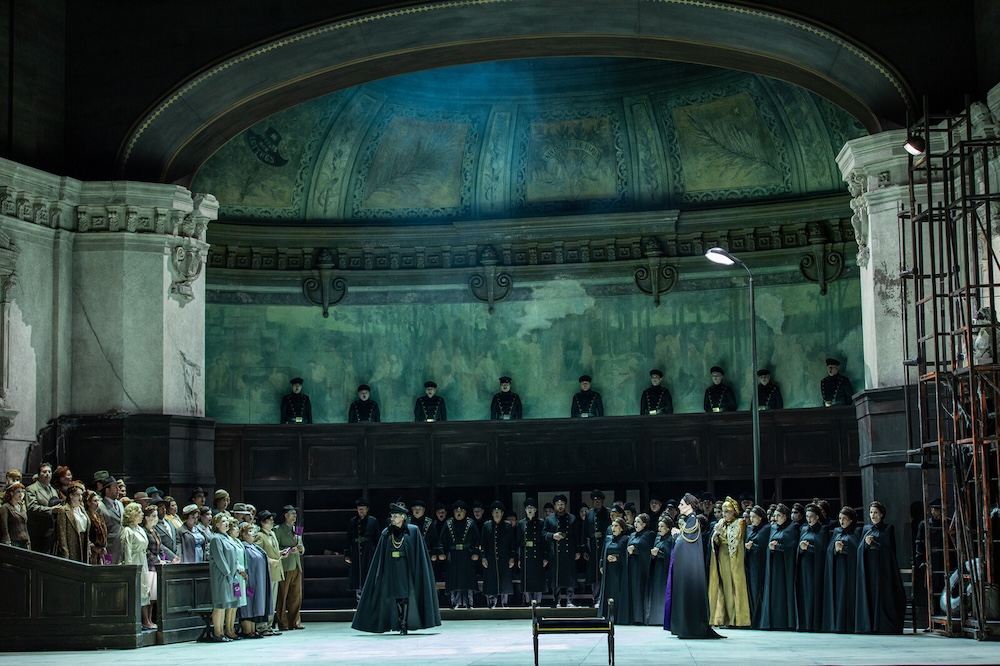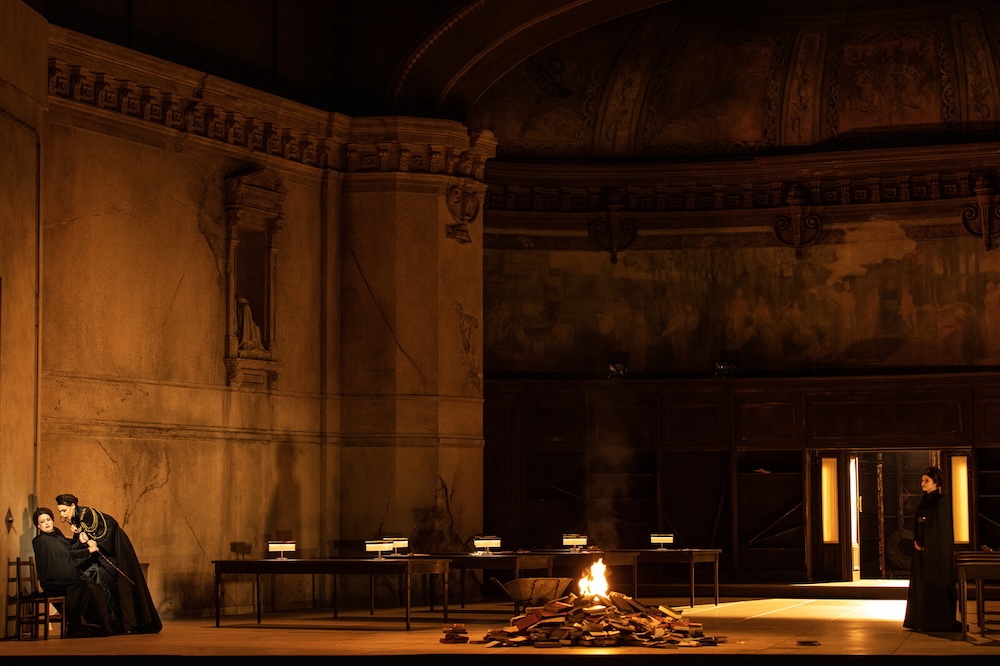Though composed in 1805 Gaspare Spontini’s La Vestale reached the Paris Opera stage finally in 1807, and then only because Empress Josephine intervened. The empress would not have been amused just now in Paris.
Nor were we, and not at all because American stage director Lydia Steiner condemned Emperor Napoleon I in her revisionist staging. But because she did it so poorly.
After all, most of us do indeed find tyranny abhorrent, and we have seen time and again that fanaticism is destructive. So Mme. Steier was preaching to the choir — boring the choir — the entirety of the 3 1/2 hour evening. Not that Spontini’s score invites such expressionistic display of ugly brutality given its limited harmonic and rhythmic resources.
Undeterred by Spontini Steier staged moments of the opera’s overture with a graffiti “Talis est ordo decorum” (rough translation “such is the way of the gods”) splayed over scenes of brutality witnessed by the drunken Roman general Licinius. The director ended the opera with the same phrase splayed on curtains that covered a sort of proscenium opening, evidently illustrating Shakespeare’s As You Like it dictum “all the world’s a stage.”

Meanwhile Spontini’s opera Licinius had gained, at last, the hand of the vestal virgin, Julia, who had been buried alive (the floor opened in the Steier staging, Julia fell through), making a happy ending. Though in Mme. Steier’s revisionist staging Licinius was betrayed by his good friend Cinna, who had initially sobered him up in the overture, and then set him on the path to rescue Julia in the first act. This interpolated ugly betrayal resulted in the unhappy murders of Licinius and Julia so that Mme. Steier could motivate her staging for Spontini’s ballet music [a ballet followed the opera before grand opera formalized its intra-act placement].
But, alas, no dancers, just Cinna ordering the execution (effected by de rigueur Uzis) of the tyrannical Grand Vestale, and then crowning himself Emperor — as had Napoleon.
If I got all this correctly, or sort of.
Spontini’s opera has earned a certain validation through Wagner’s approval of it, admiring its seriousness of subject (as opposed to the frivolity of his idea of Rossini), though Wagner surely appreciated its mixture of myth and the transcendence of love, and ignored the political implications of its origins. The opera gained even more validation when legendary soprano Maria Callas discovered its dramatic potential for La Scala audiences in 1954. It has since become a diva showpiece.
Voilà! — a showpiece for South African/French soprano Elza van den Heever, who then canceled her participation in its first two performances. French soprano Elodie Hache, scheduled for the last two of ten performances, appeared in her stead. Mme. Hache is of clarion dramatic soprano voice which she used with a fine musical intelligence. Of diminutive stature she succeeded in creating a necessarily huge presence for her role. The staging was obviously conceived for Mme. van den Heever, placing Mme. Hache at a huge disadvantage, which she largely overcame in her fine performance.

The sets for the Steier production, designed by Etienne Pluss, were smartly deployed on the Opéra Bastille stage, evoking the old fashioned era of painted sets, and too surely in the grand style of our expectations of the Opéra Bastille. The distorted staging, the dark and dismal setting, and the pedestrian costuming, affected by Katarina Schlipf, dampened the performances of a competent cast.
American tenor Michael Spires sang Licinius. With his tenor voice of beautiful baritonal colors he ably acted the drunkenness, confusion, ardor, honesty, bravery, etc., of Spontini’s Roman general with solid professionalism. His friend Cinna was sung by French tenor Julien Behr. Perhaps cast because his bright tenor leggiero voice is in vivid contrast to the darker tone of Mr. Spires’ voice, such voice does not convey the authority of Licinius’ (and Spontini’s) good friend, and certainly not the sinister tone of Mme. Steiers villain. [see lead photo, Mr. Behr in blond wig, Mr. Sprires on right]
French mezzo soprano Ève-Maud Hubeaux relished in grand voice the tyrannical cruelty of the Grand Vestale —more of a Mother Superior in this Steier version. In the ballet she humbly submitted to the authority of the newly crowned Emperor before being taken to her martyrdom. French bass Jean Teitgen was unremarkable as the High Preist (Le Souverain Pontife).
In the last mille seconds of the ballet stage director Steier once again announced that “Fanaticism is a monster [and some more words]” splayed across the stage.
Bertrand de Billy is a master conductor, well known across the repertory in the world’s major theaters. Deprived of the allure of a great diva he gracefully held Spontini’s score in account with the opera’s showpieces, ably proving that Spontini succeeded in finding a certain standing in the early 19th century Parisian opera world, and the occasional nod now in this 21st century.
The performance I attended was the 215th time La Vestale has been performed by the Paris Opera.
Michael Milenski
Opéra Bastille, Paris, France, June 19, 2024. All photos copyright Guergana Damianova / OnP, courtesy of the Opera de Paris.